If anyone asks me what my favourite dish ever is, the answer is undoubtedly Dolma (Stuffed Grape Leaves). I always thought this was a traditional Turkish recipe, but apparently its real origins are unknown. They are known as dolme in Iran, dolmades in Greece, tolma in Armenia and yerba in Syria. (Source)
We had a family friend back in Turkey who would come over and make TONS of it for me. She's from the black sea region and she would bring us these freshly picked vine leaves that tasted amazing. She was like a machine the way she rolled these. She'd make a massive pot of dolma that I would get through in one (maybe one and a half) days. When I moved to Australia, this is one food that I missed the most. Woolworths has a decent one sold in a can, but it's nowhere near as good as the homemade version.
Luckily, packaged vine leaves are relatively easy to find here in Melbourne. (Coles in Brunswick has them, for any local readers) As usual, I veer away from the traditional with this recipe. I omit the sugar, raisins and allspice that are usually included and add heaps more herbs (parsley, dill, mint, basil), garlic and lots of pine nuts. The result is just delectable. I made some over the weekend and as expected, I'd already polished them all off come Monday morning. And I have no regrets.
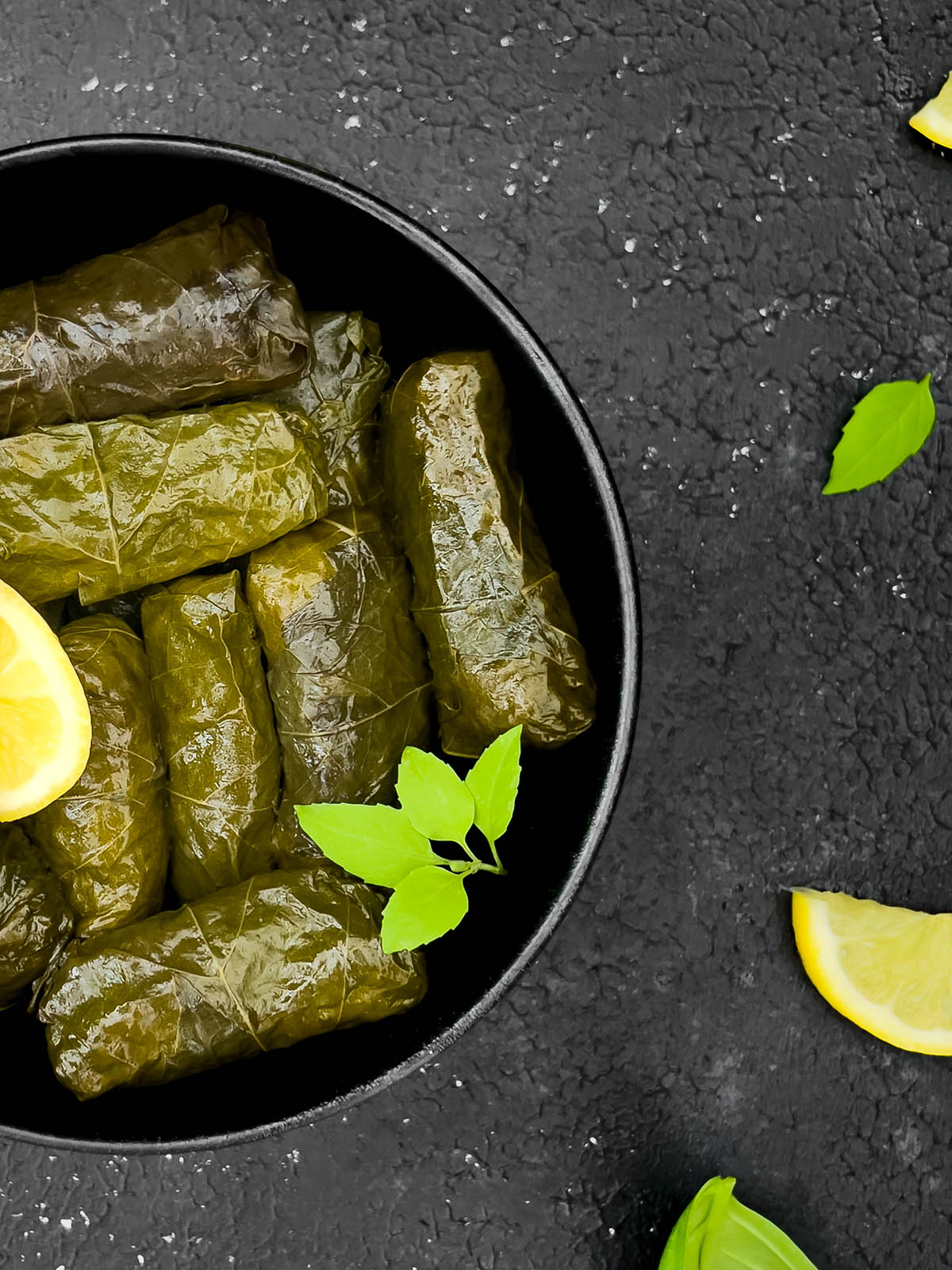
I originally planned to film a video on how to roll the vine leaves but I'm by no means a pro and there's a plethora of videos on YouTube where people who are much better at this show you the process. (Here's a great tutorial) It's a very Zen-like activity and you get much faster as you get the hang of it. I couldn't help but notice the initial ones I rolled at the bottom of the pot were much less attractive than the ones on top. Practice makes perfect I guess!
One thing I knew I would struggle with in terms of the recipe was the photos, and I was right. As scrumptious as these are, they aren't necessarily the most attractive looking food in the world. And my amateur leaf rolling skills probably didn't help matters either. But I'm really keen to share this recipe with you guys that I'm not gonna worry about the photos. I guess it's a good excuse to make these again in the near future and take better photos.
I highly recommend you try these because they're so unique in their own right, quite healthy with loads of flavour. They're quite laborious and while the recipe makes for a very large amount, feel free to use the toggle option on the recipe card and halve or quarter the recipe. Hope you like these vegan and gluten-free Stuffed Vine Leaves (Dolma) as much as I do and please let me know what you think in the comments section below if you try them out. Enjoy!
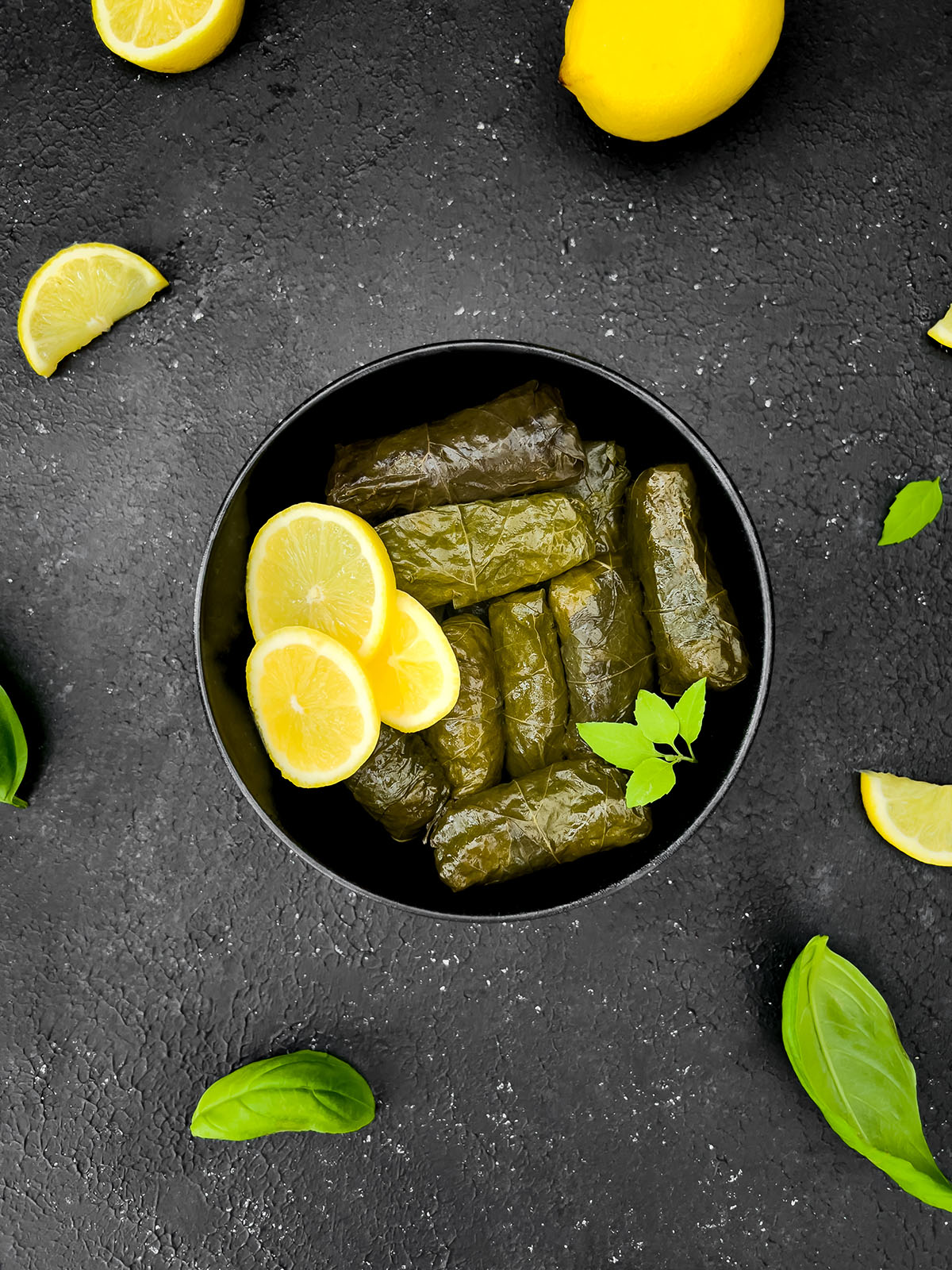
Unpack the vine leaves and soak them in a bowl with filtered water overnight. This helps get rid of the excess salt and makes the leaves more tender.
In another bowl, soak the rice in filtered water.
Drain and rinse both the vine leaves and rice and then move on to the filling.
In a large pot, sauté the chopped onions with 1/4 cup of the olive oil and salt until they're translucent. Add in the chopped garlic and pine nuts and keep sautéing until they're golden brown and fragrant.
Add in the rice and toasted for a couple of mins, toss in the herbs then cover with vegetable stock. We're only partially cooking the rice, so don't worry if the amount of liquid doesn't seem sufficient.
On low heat, keep mixing the rice until all the stock has been absorbed. Then turn off the heat, cover and set aside to cool.
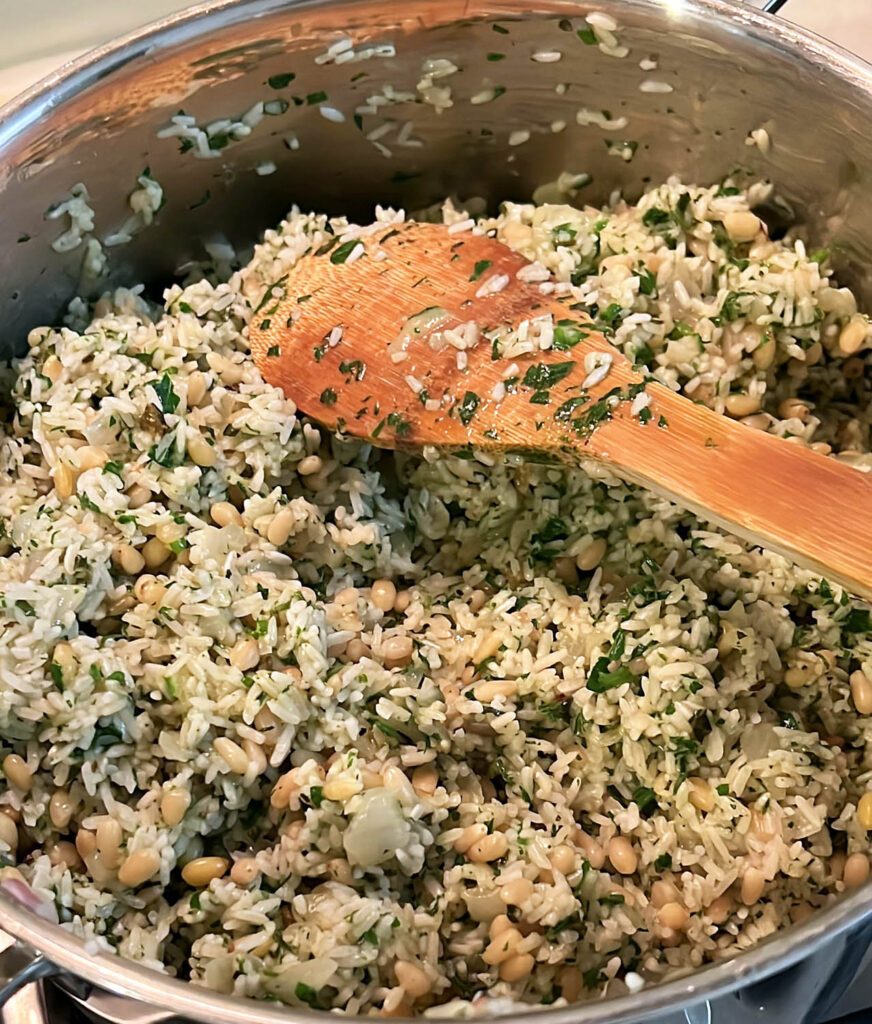
Firstly, cover the bottom of a large pot with vine leaves. It's a good idea use the imperfect ones with holes in them that can't be rolled into dolmas.
Then, using about 1-1/2 tbsp of filling (this will also depend on the size of the leaf) roll the dolmas. This is a great video explaining the rolling process: https://youtu.be/37hlFns0c4A.
Stack all the rolled dolmas onto the pan, layering them on top of each other.
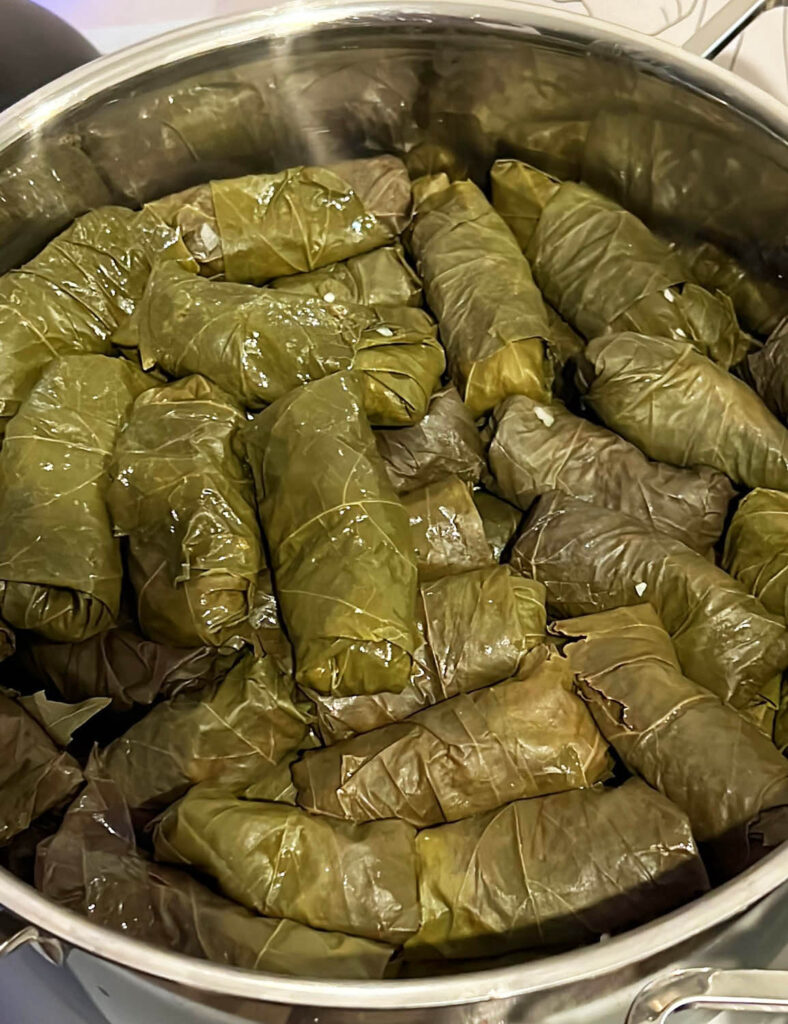
You may have a bit of leftover filling in the end, which you can cook like you would normal rice for another delicious dish.
Cover the dolmas with any excess/imperfect leaves. This is crucial to keep dolmas fresh and moist. Place lemon slices on top and pour in the remainder of the olive oil (1/4 cup).
Pour in about 1400ml of water (approximately 6 cups), turn the heat to medium, and bring to a boil.
Once it starts boiling, reduce the heat to very low and cover with a lid. Let the dolmas cook for about 90 mins. Make sure to take one out to test after the 1 hour mark and see if it requires further cooking. The rice should be fully cooked and the leaves should melt in your mouth.
Once cooked, leave the dolmas to cool then place in the fridge. They taste best when cooled in the fridge overnight, but if you don't have the patience, feel free to dig in before!
Note: These will keep fresh for up to a week in the fridge. Always make sure to keep the leaf cover and lid on to prevent drying.
Ingredients
Directions
Unpack the vine leaves and soak them in a bowl with filtered water overnight. This helps get rid of the excess salt and makes the leaves more tender.
In another bowl, soak the rice in filtered water.
Drain and rinse both the vine leaves and rice and then move on to the filling.
In a large pot, sauté the chopped onions with 1/4 cup of the olive oil and salt until they're translucent. Add in the chopped garlic and pine nuts and keep sautéing until they're golden brown and fragrant.
Add in the rice and toasted for a couple of mins, toss in the herbs then cover with vegetable stock. We're only partially cooking the rice, so don't worry if the amount of liquid doesn't seem sufficient.
On low heat, keep mixing the rice until all the stock has been absorbed. Then turn off the heat, cover and set aside to cool.

Firstly, cover the bottom of a large pot with vine leaves. It's a good idea use the imperfect ones with holes in them that can't be rolled into dolmas.
Then, using about 1-1/2 tbsp of filling (this will also depend on the size of the leaf) roll the dolmas. This is a great video explaining the rolling process: https://youtu.be/37hlFns0c4A.
Stack all the rolled dolmas onto the pan, layering them on top of each other.

You may have a bit of leftover filling in the end, which you can cook like you would normal rice for another delicious dish.
Cover the dolmas with any excess/imperfect leaves. This is crucial to keep dolmas fresh and moist. Place lemon slices on top and pour in the remainder of the olive oil (1/4 cup).
Pour in about 1400ml of water (approximately 6 cups), turn the heat to medium, and bring to a boil.
Once it starts boiling, reduce the heat to very low and cover with a lid. Let the dolmas cook for about 90 mins. Make sure to take one out to test after the 1 hour mark and see if it requires further cooking. The rice should be fully cooked and the leaves should melt in your mouth.
Once cooked, leave the dolmas to cool then place in the fridge. They taste best when cooled in the fridge overnight, but if you don't have the patience, feel free to dig in before!
Note: These will keep fresh for up to a week in the fridge. Always make sure to keep the leaf cover and lid on to prevent drying.

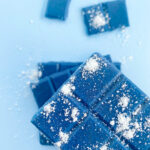


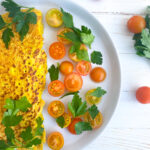

I love dolmas but was always hesitant to try making them at home. It was so easy and so much better than the canned dolmas!
Thanks Holly!
I live in Cyprus, where Dolmadakia are very popular. I never made them before though – shame on me 😁
Thank you for showing how easy it is to make stuffed vine leaves. Great recipe!
It’s so interested so many countries have this recipe in their own cuisine! Definitely recommend making your own!
I grew up eating dolmas so it’s great to have a recipe to be able to make it at home. Your filling is absolutely perfect!
Thanks for the comment Anaiah! The filling is not super traditional but it’s so tasty and healthy!
i love these dolmas that are vegan and plant based. thanks fo this delicious recipes.
Thanks for commenting Nancy! My pleasure.
I’ve never had vine leaves before, I can’t believe I haven’t. This looks and sounds like a dish packed full of flavour. I love trying new foods so I can’t wait to make this.
They’re so tasty and unique! I would definitely recommend them.